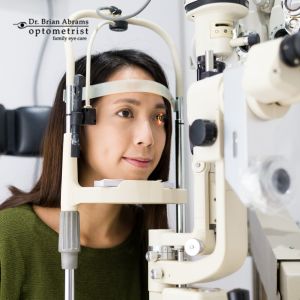Our eyes are a gateway to the world around us and reflect our overall health. While maintaining eye health is crucial for everyone, it’s imperative for those suffering from diabetes. Did you know diabetes is the leading culprit behind vision loss in adults? If you’re living with diabetes, scheduling regular eye exams with an experienced optometrist near Woodbridge can go a long way in preserving your vision. Dr. Brian Abrams, a leading optometrist in Woodbridge, understands the significance of regular monitoring and early detection of diabetes-related vision problems. Read on to learn how diabetic eye exams can safeguard your vision.
Diabetic Eye Exams: Why They Matter
Diabetes is a complex condition that affects various organs, including the eyes. It significantly increases the risk of vision problems like cataracts, diabetic retinopathy, and glaucoma. Diabetic retinopathy(DR) is one of the most damaging eye-related complications of diabetes. The condition occurs when elevated blood sugar levels damage the blood capillaries in the retina, the light-sensitive tissue at the back of your eyes. The progressive damage caused by diabetic retinopathy is the leading cause of blindness among working-age adults. That’s why early detection and treatment of diabetes-induced eye diseases is paramount.

People with diabetes may not initially notice imperceptible changes in vision or symptoms. Unfortunately, diabetes progression can trigger vision ems like DR and glaucoma. Regular diabetic eye exams are pivotal in spotting early signs of diabetic retinopathy. Experienced optometrists like Dr. Brian Abrams specialize in diabetic eye care and use leading-edge technologies like Optical Coherence Tomography(OCT) to detect the earliest signs of vision problems. This helps in the timely implementation of necessary interventions to mitigate potential complications and prevent further vision deterioration.
Early stages of diabetic retinopathy may not require treatment but need regular monitoring. Advanced stages of diabetic retinopathy may require laser treatment or other ocular procedures.
Diabetic Eye Exams: What to Expect
Undergoing an eye exam may make some individuals feel apprehensive, but rest assured–diabetic eye exams are painless and non-invasive. Your optometrist in Woodbridge will perform a comprehensive eye assessment, including dilating the pupils to get a clear view of the retina. This process enables them to detect signs of retinal damage like micro-aneurysms, swelling, scar tissue, or blood vessel abnormalities. Your doctor may prescribe an Optical Coherence Tomography, a non-invasive imaging test that captures cross-sectional digital images of the retina. It enables your optometrist to view and measure retinal layers, signs of swelling or fluid accumulation to detect early stages of diabetic retinopathy.
These eye exams also assess other eye health factors, like intraocular pressure (for detecting glaucoma), visual acuity, and peripheral vision. Regular screenings also help monitor existing eye conditions and the effectiveness of your diabetes management plan. Schedule a prompt consultation with an experienced optometrist near Woodbridge if you’re experiencing changes in vision like blurriness, eye floaters, or poor night vision.
Dr. Brian Abrams: Your Trusted Optometrist in Woodbridge
Your eyesight is a precious gift–preserve it with a knowledgeable and experienced optometrist like Dr. Brian Adams by your side. A specialist in diabetic eye care, he advocates a proactive approach with regular, comprehensive eye exams for timely and accurate diagnosis.
Dr. Adams’ professional expertise, state-of-the-art ocular technology at the clinic, and personalized care by our optometry team ensure the best possible eye health outcomes.


